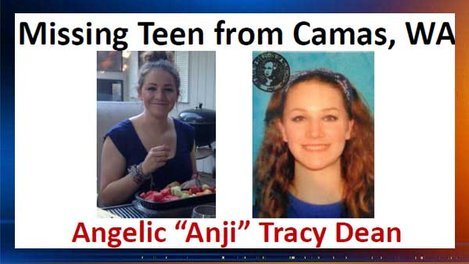#polaris project

Standing in solidarity with our END IT coalition partners today.
We believe tech can help end slavery. Will you join us?

A poster raising awareness of Anji Dean’s disappearance, thought to be associated with the sex trade.
17-year-old Anji Dean disappeared from her Washington home around 9-10:30 p.m. on June 23rd. Days before, she texted her boyfriend saying she had gotten involved in a bad situation and that someone was threatening to kill him and her family. A journal was found under her bed, with the chilling statement: “If you’re reading this, I am either missing or dead.”
Her case is believed to be a sex trafficking case for many reasons. She had been hinting, like in the texts to her boyfriend, that she was “involved in something,” “in over her head,” and “scared,” according to her mother. She left behind her wallet, bank card, glasses, and clothes. The authorities have also discovered a cell phone that Anji’s parents didn’t know of.
“People don’t want to believe that children are being sold for sex,” said John Ryan, the CEO of the National Center for Missing and Exploited Children. “Not in this country."
While the Democratic Republic of the Congo, North Korea, Saudi Arabia and Iran are the worst offenders of human trafficking, the U.S.’s National Human Trafficking Resources Center’s hotline received almost 32,000 calls in 2013, from every state and D.C. in rural, suburban, and urban communities.
According to the Polaris Project, sex trafficking can take many forms. Fake massage businesses and residential brothels are just a few examples. Truck stops are inundated with young girls offering sex for money, often to fill their pimp’s quota. Prostitutes as young as 12 are sold on the streets, and increasingly, the Internet.
Traffickers seduce and coerce women via social media and chat rooms. Targets include girls with unstable home lives, poor mental health, and low self esteem. Once the girls and women are under their control, their sweet talk and flattery disappears, replaced by abuse, threats, and orders to have sex with, in some cases, as many as 48 men in one day.
This June, the FBI and National Center for Missing and Exploited Children partnered for their eighth annual week of scouring streets, truck stops, the Internet and more for victims of child sex trafficking. This year, they rescued 168 children and arrested 281 pimps.
Human trafficking is one of the fastest growing criminal industries in the world, according to the Polaris Project.
"These are not children living in some faraway place, far from everyday life,” said FBI director James Comey. “These are our children, on our streets, our truck stops, our motels. These are America’s children.”
If you or someone you know is a victim of sex trafficking, call 1-888-373-7888 or text to BeFree (233733).
